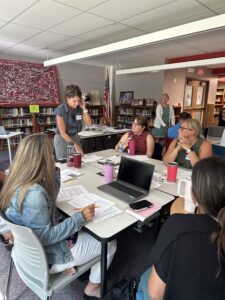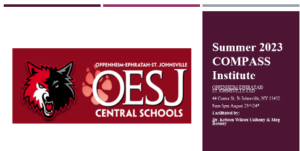Engagement and Continuous School Improvement in the New School Year: NYKids and Oppenheim-Ephratah St. Johnsville’s COMPASS Institute Highlights
By Jessie Tobin, Kristen C. Wilcox & Meg Rooney
What Do We Know About Engagement?
“[My] priority was [to] build relationships built on mutual respect and transparency and know where people are coming from . . . [to] make ourselves accessible to parents, to comfort them or reassure them, answer questions. It’s something that we definitely prioritize and have to continue prioritizing.”
– Educator, NYKids study
Attention to the connections between engagement and interpersonal relationships has increased since the COVID-19 pandemic. The term “engagement” can be applied toward students, educators, and parents and caregivers, and it takes on several different forms in schools.
Student engagement refers to the energy, interests, and emotional experiences of youth participating in educational activities and the “policies and practices” within schools which invite cognitive and motivational involvement from learners.

As educators promote engagement among learners in and outside the classroom, they often collaborate with one another in professional development, school improvement teams, and school-wide faculty meetings: these are pathways to educator engagement.
Engaging parents and caregivers in educational activities also takes many forms that include two-way communications focused on student learning and wellbeing, community-based events inviting family member participation, and parent and caregiver assistance with homework or other school programs.
As the definitions and types of engagement vary, scholars have found that engagement among education stakeholders leads to a myriad of beneficial outcomes such as increased academic achievement, increased student mental health and emotional wellbeing, and overall better learning experiences.
Engagement in the Pandemic Era and Beyond
When instruction switched to remote and/or hybrid learning for an extended period beginning in 2020, many education professionals, parents, and caregivers grew concerned for the academic, mental, and emotional wellbeing of youth due to the limits to in-person interaction. Educators around the world were tasked with finding adaptations to support student engagement and communicate effectively with family members.
Promising Practice #1: Trusted Adults
Through NYKids’ study investigating educators’ experiences during the COVID-19 pandemic, we discovered engagement was a top priority among educators. Amid challenges, educators found innovative ways to maintain connections and relationships between staff and students in order to foster academic engagement and positive social and emotional experiences for youth. In one school we studied, Whitesboro Middle School, school leaders and educators created a trusted adult program to ensure each child had an adult with whom they felt safe and could connect with through structured mentor meetings.
We just asked them [students] to list two or three staff members [that] if you were having a bad day or needed someone to talk to, who would those staff members be that you would be willing to talk to? . . . and we’ve continued to do that, but it also gave us an idea of which students did not have connections.
– Whitesboro Middle School Principal
Promising Practice #2: Frequent Multi-way Communications
School-family relationships and communications were also transformed through the disruptions of the pandemic as educators applied new strategies to reach families of varying backgrounds and experiences with schooling. One strategy educators in our study used to foster family engagement was through increased use of technology and social media platforms, which provided spaces for parents and caregivers to stay up to date on students’ daily activities. Educators and leaders also made efforts to interact with parents and caregivers in meaningful ways to encourage their input in school programs and policies. This increased communication came in the form of surveys, forums, and committees.
 Promising Practice #3: Prioritize Collaboration and a Team Approach to Improvement
Promising Practice #3: Prioritize Collaboration and a Team Approach to Improvement
The findings from NYKids latest study unearthed concerning findings in relation to educator engagement that point to the need to prioritize educator collaboration time and take a team approach to school improvement to mitigate negative impacts of leader and educator attrition. Providing time and space for educators and leaders to come together to discuss problems of practice ensures that improvement initiatives are supported by multiple critical perspectives that center educator autonomy and distribute leadership across many people.
The benefits of allotting the time for this kind of collaborative work is reflected in our recent continuous improvement workshop with Oppenheim-Ephratah-St. Johnsville (OESJ) CSD. During this two-day COMPASS institute held on August 23-24, participants drew on NYKids research to support their teams’ efforts in designing goals and action steps. For our partners, it was clear that rebuilding systems of support and communication among one another, while increasing student, parent, and family engagement, were top priorities. See below participants’ key “takeaways” from this institute:
“This is hard stuff, but attainable with a group I am excited to be involved from its infancy and looking forward”
“Takes a “village” to get our goals to be successful”
“In order to show that things are improving you must have an action plan that must be measurable”
“We need to share/communicate our goal with all staff”
“I feel excited and empowered to make our building a better place for all”
“This work will be impactful with lots of moving parts but we are on the same page that change is needed and welcomed”
“I am not alone in my thinking others have the same ideas and needs”
These comments speak to the importance of structuring time for teams of educators to come together to tackle complex issues such as engagement. We are delighted to be on OESJ’s improvement journey throughout the 23-24 school year and look forward to reporting out on their learning and progress in the coming months.
If you or someone in your organization is interested in partnering with NYKids for school improvement workshops, full-day institutes, or hands-on virtual meetings to learn how to use our performance tracker or other resources, please contact us at nykids@albany.edu
As always, we invite you to follow us on Twitter, Instagram, or Facebook.
